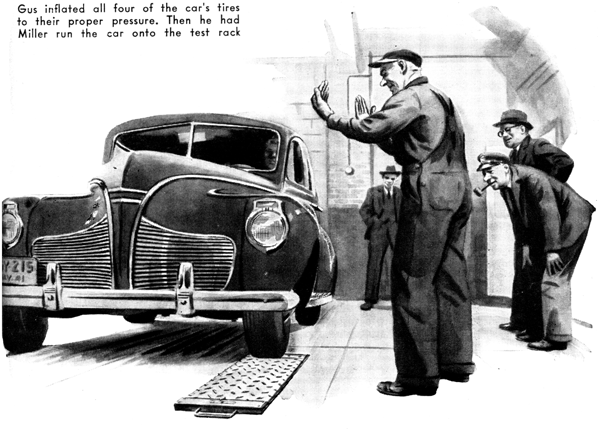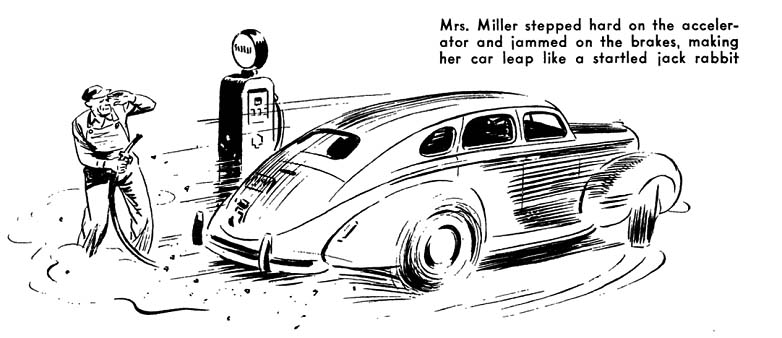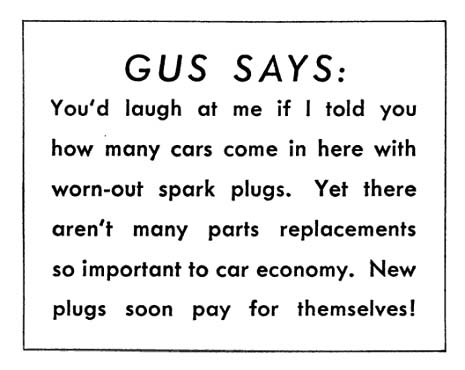November 1941
GUS TALKS TIRE
by
Martin Bunn
Rubber is a strategic material now.
But it takes very little strategy to
improve tire mileage

Joe Clark was busy and testy over the job of sending the Model Garage's customers their monthly accounts, and Bill, the mechanic, was out with the wrecker, so Gus Wilson was taking care of the gas pump -- a job he detests.
He'd just sent a customer on his way with a full tank and was heading relievedly for the shop door when he was stopped by the excited honking of a horn. Turning he saw the Miller sedan coming up the driveway in a hurry. It stopped with an outraged shriek from its misused brakes and a squeal of rubber that made Gus wince.
Mrs. Miller, smiling brightly, stuck her marcelled head out of the window and as is her way, immediately began to gush conversation! "Oh, Mr. Wilson, I'm in such a rush! Conference after conference! I've been at a meeting of the Defense League all afternoon arguing and pleading that rifles be provided for us women, and that we have military drill. Don 't you think that's a good idea, Mr. Wilson?"
"Well," Gus started. "It seems to me that . . . "
"Of course you do!" Mrs. Miller broke in. "It would seem that way to anyone who didn't have submersive -- I mean subversive -- ideas. But I was overruled, Mr. Wilson! Those who are content with half measures contended . . . Now, what was it that I stopped for? Oh, yes -- gasoline. My tank's empty."
Characteristically, Mrs. Miller had stopped her car in a position which put the filler of the gas tank a foot beyond the range of the pump hose. "If you'll just move forward a little -- " Gus suggested.
"Oh, of course -- how stupid of me!" Mrs. Miller released her brake, stepped hard on the accelerator, and jammed the brakes on again in a sudden maneuver which made her car leap forward six feet and stop like a startled jack rabbit. Then she stuck her head out of the window again and continued her conversation as Gus filled the tank. "I try so hard to save gas, but somehow I'm always running short on it. But what else was it that I -- oh, yes, of course. Tires, I heard an OPM man speak at a meeting yesterday, and he told us that before long rubber products are going to be almost impossible to get. So I told Henry that we'd better buy a new set of tires right away. He said to ask you what you thought about it."
Gus made a circuit of the car as he examined the tires. One rear appeared to have at least five pounds more air in it than the other, and both of them had numerous flat spots on their treads, the result of Mrs. Miller's too-emphatic braking. Three of the four valve caps were missing. The outside wall of the right front was badly cracked from the hard knocks it had taken against curbs, and the treads of both fronts were worn in an uneven, scalloped pattern. The spare, which apparently never had been used since it was bought, felt dry and brittle.
"You need a new set of tires all right," Gus said. "But just new tires wouldn't do much good. Your front end is badly out of alignment, Mrs. Miller."
"You mean that my car should be put on that funny testing machine again? Why, you did that, and sent Henry a big bill, only last spring."
"Yes," Gus said, "but wheel alignment is something like gasoline and tires -- you use it up as you drive, and it has to be replaced. Unless your front end is straightened out your new tires soon will be as badly worn as the ones you have on now."
"Well," Mrs. Miller decided. "I'll have to speak to Henry about it."
She kicked the starter, released her brake, and stepped on the gas so suddenly that the rear wheels spun, and the car shot down the driveway.
George Knowles had driven up to the pump. He looked at Gus and shook his head. "That woman," he said, "is a public menace. The gas and oil and rubber she wastes would keep a tank running. There ought to be a law!"
Gus nodded. "The funny thing about it is that no one has better intentions than our friend Henry's wife," he said.
Knowles snorted. "You know where they've put a priority on good intentions -- for paving material!" he said. "There ought to be a law!"
Several of us dropped in at the Model Garage that evening. We sat around talking about the shortage in rubber and how darned careful we'd all have to be of our tires as we watched Gus fussing with a wheel he'd taken off his own roadster. Finally some one asked him what he was doing.
I'm doing what you fellows are talking about," he said, looking up with a grin. "Making my tires last longer."
"How?" Doc Foley asked.
"By balancing this wheel," Gus told him. "As you see, it has a new tire. The tire happens to have a heavy spot in it and these two half-ounce weights I'm attaching to the rim opposite the heavy spot when properly spaced will balance the wheel exactly. Balancing the wheel will keep it from shimmying, the tire will run cooler and wear evenly and I'll get longer service out of it. And because the balanced wheel won't pound the road the way an unbalanced one would, there'll be less vibration and my car will last longer."
Ez Zacharias shifted his cud of tobacco into his left cheek. "Shucks!" he said disparagingly. "That heavy spot that's got you all het up -- how much does it weigh?"
"About an ounce," Gus told him. "That doesn't seem much, but one ounce out-of-balance at the run generates a centrifugal force of 12 pounds at 60 miles an hour and of 21 pounds at 80 miles an hour -- not that I'm fool enough ever to drive at 80. But even at 35 the radial force jerks the wheel up and down and sideways, and shimmy begins. That makes diving uncomfortable, and makes the tire wear unevenly and also wears the kingpin bushings and tie-rod ends unnecessarily. The radial force . . . "
Ez growled. "Quit talkin' like a college perfessor! I don't have to know nothin' about radial forces to drive my R.F.D. route, and I ain't goin' to start adlin' my brains over a lot of such-like highbrow stuff. I jest want to know, in plain English, how I can make my tires last longer."
"That's what we all want to know," Doc Foley put in. "How about it, Gus?"
"Well, there are three ways of doing it," Gus said, "and no one of them is of much use without the other two. By driving sensibly, by giving your tires a little attention before they start giving you trouble, and by keeping your bus in first-class mechanical condition."
"Just what do you mean by driving 'sensibly'?" Doc asked.
"I mean using your head to save your rubber," Gus said. "A sensible driver doesn't wreck the sidewalls of his tires by carelessly scuffing them against the curb when he parks. He isn't so set on beating the other fellow on every get-away that he tramps on his gas so hard that his rear wheels spin. He doesn't make cowboy stops at the expense of a wearing flat spots on his tire treads by making his wheels slide. He doesn't take sharp curves at high speed, he doesn't overload his car, and he doesn't drive at sustained high speed unless he's really in a heck of a hurry to get some place -- which most of the speed demons you see on the roads aren't!"
"Well," George Knowles remarked. "I don't think that any of us here tonight are guilty of those elementary forms of foolishness -- not often, anyway. But this attention you say we should give our tires -- just what sort of attention do you mean?"
"Now I'll ask you one," Gus came back at him. "How often do you have the pressure in your tires checked?"
"How often? Why, whenever I think they need checking," Knowles said.
"That isn't often enough -- or regularly enough," Gus told him. "You should have your tires checked once a week -- whether or not you think they need it. Improper inflation is the most common cause of unnecessary tire wear. And by improper inflation I mean greater pressure or less pressure than is recommended by the makers of your car and tires. Underinflation causes unnecessary wear on the sides of the treads, and overinflation causes excessive wear on the center of the treads. And you should make certain that your inflation is balanced -- that there isn't a difference in the pressure in the two tires on the same axle. Unbalanced inflation causes hard steering, undue tire wear, and waste of gasoline.
"When you've got the correct pressure in your tires, help to keep it there by keeping the valve caps properly tightened down. They act as a seal for the air in the inner tubes as well as keep the dirt out."
"I've been checkin' up," Ez Zacharias said. "I reckon I rate 100 percent on takin' care of tires, Gus."
"You do, hey?" Gus said. "How about your spare tire?"
"I ain't never had to use th' one I've got on now, an' I've traveled over 30,000 on my rubber!" Ez cackled.
"Last time you had your car in here I noticed that your spare never had been used," Gus said. "You're making a mistake, Ez. Your spare is deteriorating as fast lying there in its compartment as it would be wearing out if you were giving it its fair share of use. What you're really doing in the long run, is paying for five tires to get the mileage out of four."
Ez thought that over -- and saw the light. "By cracky, I believe you're right!" he yelled. "First thin in th' mornin' I'll yank off a tire and put that spare to work!"
"If you want to get the greatest possible mileage out of the five tires in a set," Gus told him, "just substituting your spare for another tire isn't enough. You should shift all your tires about every 4,000 miles. Take off the right front -- that's the tire that gets the most scuffing -- and put it in the spare compartment. Shift the left rear to the right front. Replace the left rear with the left front. Shift the right rear to the left front. Then put your spare tire on the right rear."
A car stopped outside the shop door, and half a minute later Henry Miller came in, looking worried. "Say, Gus, the missus tells me that you say there's something wrong with our front-end again. You fixed that up not so long ago. Wouldn't a new set of tires do for now?"
"I'm sorry, Henry, but it wouldn't," Gus said. "I don't know just what's the matter with your front end, but I can tell from the way your tires have worn that it's out of alignment somewhere. Putting new tires on without straightening it would just be wasting good money -- and good rubber."
"All right," Miller said. "You're the doctor, Gus. Got time to take a look tonight?"
"Sure thing," Gus said. "Bring your bus in and I'll check it.
Miller drove his car into the shop. The first thing that Gus did was reach in and try the steering wheel. "Too loose," he said, making a note of his order pad. "That's bad for your tires. Now let's check 'em."
He checked the tires. Each showed a different pressure, and only one of the four showed the correct pressure. Gus shook his head sadly. "You ought to try to get Mrs. Miller to stop in here once a week and have her tires checked," he said. "They'd last a lot longer if she would."
He inflated the tires to their proper pressure. Then he had Miller run the car onto the wheel-alignment rack, and made a lot more notes on his order pad. Then he compared his notes with a table of figures in a book he brought over from his workbench.
"Some one must have given your front-end a hard bump while you were parked," he told Henry diplomatically. "All the steering angles are off. To get good service out of these modern cars you've got to have the caster and camber and toe-in in exact agreement with the manufacturer's specifications . . . Knee action is O.K. . . . Kingpins are loose." He checked the brakes.
"Here's a broken brake-shoe return spring," he reported. "That makes the shoe drag, and plays the devil with the tire . . . There's oil leaking from the rear-end, Henry -- a gasket must have gone bad. Your left rear tire is oil soaked -- there must be a puddle from the leak on your garage floor. Oil's very tough on rubber, you know, and ruins brake linings . . . . Well, I guess that's all, Henry. Bring your bus around as soon as you can, and I'll fix it up."
"I'll leave it here now," Henry said. "And I'm going to tell the missus plenty about the way she's got to treat those new tires!"
END
L. Osbone 2019

